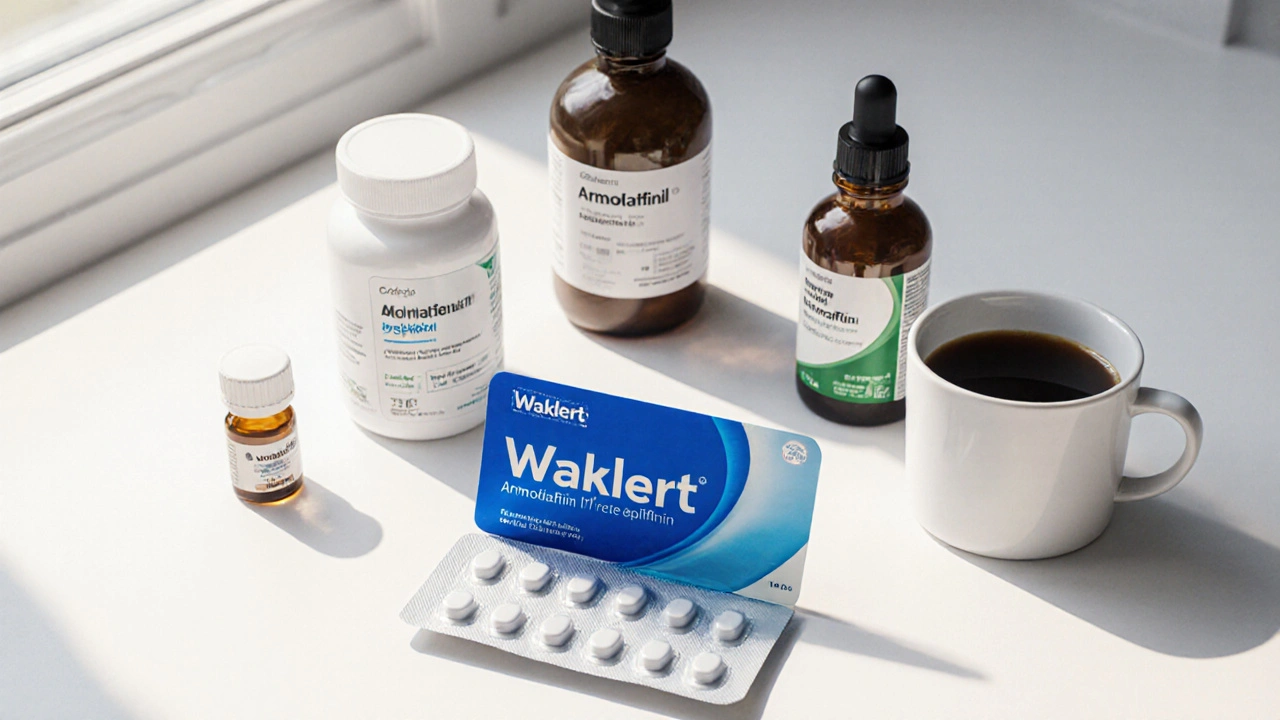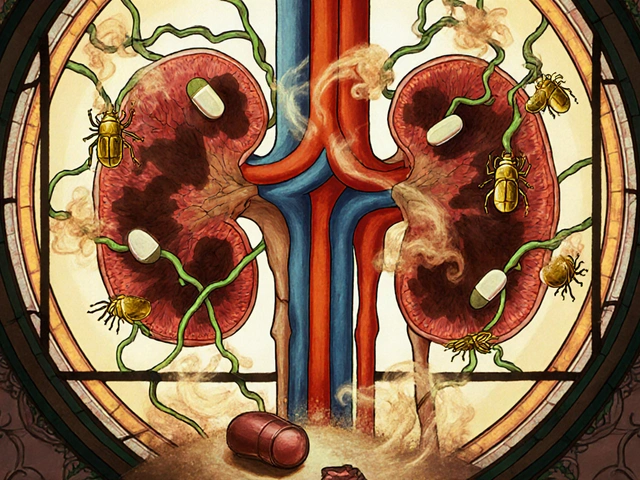Waklert vs Other Wake-Promoting Drugs Comparison Tool
Waklert (Armodafinil)
- Mechanism: Selective dopamine reuptake inhibition, orexin activation
- Onset: 30-60 minutes
- Half-life: ≈15 hours
- Dosage: 150 mg once daily
- Prescription: Yes (Schedule IV)
- Cost: ~$0.30/mg (generic)
Modafinil (Provigil)
- Mechanism: Same as Armodafinil but racemic mixture
- Onset: 30-60 minutes
- Half-life: ≈12 hours
- Dosage: 200 mg once daily
- Prescription: Yes (Schedule IV)
- Cost: ~$0.25/mg (generic)
Adrafinil
- Mechanism: Pro-drug → Modafinil in liver
- Onset: 60-90 minutes
- Half-life: ≈12 hours (active metabolite)
- Dosage: 300 mg once daily
- Prescription: No (OTC supplement)
- Cost: ~$0.10/mg
Caffeine
- Mechanism: Adenosine receptor antagonist
- Onset: 5-15 minutes
- Half-life: ≈5 hours
- Dosage: 80-200 mg (coffee)
- Prescription: No
- Cost: Negligible
Solriamfetol (Sunosi)
- Mechanism: Dopamine-norepinephrine reuptake inhibitor
- Onset: 30-45 minutes
- Half-life: ≈7 hours
- Dosage: 75 mg once daily
- Prescription: Yes (Schedule IV)
- Cost: ~$1.20/mg
Amphetamine-based Stimulants
- Mechanism: Increases release of dopamine & norepinephrine
- Onset: 15-30 minutes
- Half-life: ≈10 hours
- Dosage: 5-30 mg split dose
- Prescription: Yes (Schedule II)
- Cost: ~$0.15/mg
Key Takeaways:
- Waklert offers the longest duration and most consistent alertness among the e-modafinil family.
- Modafinil is cheaper and suitable for short-term use.
- Adrafinil is OTC but can stress the liver.
- Caffeine is cheap and fast-acting but causes quick crashes.
- Solriamfetol provides strong wake-promotion but carries higher abuse potential.
- Amphetamines offer maximum alertness but are highly addictive and risky.
Quick Take
- Waklert (Armodafinil) offers the longest half‑life and most consistent daytime alertness among the e‑modafinil family.
- Modafinil (Provigil) works similarly but has a slightly shorter duration and a lower cost.
- Adrafinil is an over‑the‑counter pro‑drug that converts to Modafinil in the liver, but it can strain kidneys.
- Caffeine is cheap and legal but peaks quickly and can cause jitters.
- Solriamfetol (Sunosi) and amphetamine‑based stimulants provide stronger wake‑promotion but carry higher abuse potential.
If you’re hunting for a reliable way to stay alert-whether for narcolepsy, shift work, or a demanding study schedule-you’ve probably heard the name Waklert. But the market is crowded with similar‑acting compounds, and each has its own strengths, drawbacks, and legal nuances. This guide walks you through the most relevant alternatives, lines them up side‑by‑side, and helps you decide which one fits your lifestyle and health profile.
What is Waklert (Armodafinil)?
Waklert is a branded form of Armodafinil, a prescription medication that promotes wakefulness by selectively targeting the central nervous system. It was approved in the United States in 2012 for narcolepsy, obstructive sleep apnea, and shift‑work sleep disorder. Armodafinil is the R‑enantiomer of Modafinil, meaning it’s the more pharmacologically active half of the racemic mixture. This results in a half‑life of about 15hours, providing a smoother, longer‑lasting alertness curve compared with its sibling.
Key attributes:
- Onset: 30‑60minutes
- Peak effect: 2‑4hours
- Half‑life: 15hours
- Common doses: 150mg (once daily)
- Legal status: Prescription‑only (Schedule IV in the US, ClassC in the UK)
Common Wake‑Promoting Alternatives
Below are the most frequently mentioned counterparts. Each is introduced with a brief, micro‑data‑rich definition to help search engines understand the relationships.
Modafinil (Provigil) is a racemic mixture of the R‑ and S‑enantiomers of the same core molecule as Armodafinil. It shares the same primary indication-narcolepsy-but is generally priced lower because of wider generic availability.
Adrafinil is an over‑the‑counter pro‑drug that metabolises into Modafinil in the liver. It was originally developed in France and is still sold in some European countries as a supplement, though many health agencies warn about potential liver toxicity with chronic use.
Caffeine is the world’s most consumed psychoactive stimulant, found naturally in coffee, tea, and many energy drinks. It blocks adenosine receptors, giving a quick lift that peaks within an hour and fades after 3‑5hours.
Solriamfetol (brand name Sunosi) is a dopamine‑norepinephrine reuptake inhibitor approved for excessive daytime sleepiness in narcolepsy and obstructive sleep apnea. Its stimulant profile is stronger than Modafinil, with a half‑life of about 7hours.
Amphetamine‑based stimulants (e.g., Adderall, Dexedrine) are powerful central nervous system activators prescribed for ADHD and occasionally for narcolepsy. They produce a rapid, high‑intensity boost but carry a high abuse potential and can elevate blood pressure.
How Do We Compare Them?
To make a fair decision, we evaluate each drug across six practical dimensions:
- Mechanism of action - how the compound promotes wakefulness.
- Duration of effect - from onset to when alertness fades.
- Side‑effect profile - common and serious adverse events.
- Legal & prescription status - what you need to obtain it.
- Cost & insurance coverage - out‑of‑pocket expense in the UK and US.
- Typical use cases - which patient groups benefit most.
Side‑by‑Side Comparison Table
| Drug | Mechanism | Onset | Half‑life | Typical Dose | Prescription? | Cost (US, generic) |
|---|---|---|---|---|---|---|
| Waklert (Armodafinil) | Selective dopamine reuptake inhibition, orexin activation | 30‑60min | ≈15h | 150mg once daily | Yes (ScheduleIV) | $0.90/mg (brand) - $0.30/mg (generic) |
| Modafinil (Provigil) | Same as armodafinil but racemic mixture | 30‑60min | ≈12h | 200mg once daily | Yes (ScheduleIV) | $0.25/mg (generic) |
| Adrafinil | Pro‑drug → Modafinil in liver | 60‑90min | ≈12h (active metabolite) | 300mg once daily | No (OTC supplement) | ≈$0.10/mg |
| Caffeine | Adenosine receptor antagonist | 5‑15min | ≈5h | 80‑200mg (coffee) | No | Negligible |
| Solriamfetol (Sunosi) | Dopamine‑norepinephrine reuptake inhibitor | 30‑45min | ≈7h | 75mg once daily | Yes (ScheduleIV) | $1.20/mg |
| Amphetamine‑based (Adderall) | Increases release of dopamine & norepinephrine | 15‑30min | ≈10h | 5‑30mg split dose | Yes (ScheduleII) | $0.15/mg |

Which One Is Right for You?
Waklert shines when you need a full‑day, steady boost without the mid‑afternoon crash that some users report with Modafinil. Its longer half‑life makes it the go‑to for night‑shift workers who start early and finish late.
Best for: Narcolepsy patients who experience frequent sleep attacks throughout a 16‑hour waking window, and professionals who dislike taking two doses.
Modafinil is a solid, lower‑cost alternative with a slightly shorter duration. If you’re sensitive to lingering effects into bedtime, Modafinil may let you sleep earlier.
Best for: Students who need alertness for a single 6‑hour study block and want to minimize evening impact.
Adrafinil appeals to those who can’t get a prescription but accept the trade‑off of liver‑related lab monitoring. It’s also popular among “no‑prescription” communities, though the legal gray area can be risky.
Best for: People in countries where Modafinil is heavily regulated but over‑the‑counter supplements are still sold.
Caffeine remains unbeatable for cost and accessibility, but its rapid rise and fall can cause jitters, anxiety, and a “crash” that hampers productivity.
Best for: Light‑to‑moderate alertness needs, such as a mid‑morning coffee to clear sleep inertia.
Solriamfetol offers a stronger stimulant effect, useful for patients with severe residual sleepiness despite other treatments. However, it can raise blood pressure and has a higher price tag.
Best for: Individuals with obstructive sleep apnea who still feel drowsy after CPAP therapy.
Amphetamine‑based stimulants deliver the most intense wakefulness but bring cardiovascular risks, insomnia, and a high potential for dependence. They’re usually reserved for ADHD or refractory narcolepsy where other agents have failed.
Best for: Short‑term, high‑intensity tasks where maximum focus outweighs side‑effect concerns (e.g., military operations, emergency medicine). Use only under strict medical supervision.
Practical Considerations Before Starting
- Prescription process: In the UK, Waklert is classified as a ClassC controlled drug, meaning you’ll need a specialist (neurologist or sleep‑medicine clinic) to prescribe it. Modafinil follows the same pathway, while Adrafinil can be bought online with fewer checks.
- Insurance coverage: NHS often covers Modafinil for narcolepsy but is stricter with Armodafinil due to its newer status. Private insurers may require a step‑therapy trial of Modafinil first.
- Drug interactions: All wake‑promoting agents can interact with hormonal contraceptives, SSRIs, and certain anti‑epileptics. Always run a medication review.
- Kidney & liver health: Adrafinil and high‑dose caffeine place extra stress on the liver, while amphetamines can affect renal clearance. Baseline labs are recommended for long‑term use.
- Titration strategy: Start with the lowest effective dose-often 50mg of Armodafinil or 100mg of Modafinil-and increase weekly if needed. Avoid taking the drug after 3PM to prevent insomnia.
Pitfalls to Avoid
- Assuming “all stimulants are the same.” The pharmacokinetics differ enough to impact sleep timing.
- Skipping the medical evaluation. Underlying sleep apnea or heart disease can make a stimulant dangerous.
- Buying from unverified online pharmacies. Counterfeit Armodafinil has been reported with incorrect dosing.
- Mixing with alcohol. Even low‑dose caffeine can worsen hangover symptoms; stronger agents amplify the risk.
- Neglecting regular follow‑up. Tolerance can develop, and side‑effects like rash or mood changes need monitoring.
Frequently Asked Questions
Frequently Asked Questions
Is Waklert the same as Modafinil?
Waklert contains only the R‑enantiomer (Armodafinil), while Modafinil is a 50/50 mix of R‑ and S‑enantiomers. This makes Waklert slightly more potent and longer‑acting, but the core wake‑promoting mechanism is shared.
Can I buy Armodafinil without a prescription?
In the UK and US it is prescription‑only. Some overseas websites claim to sell it OTC, but those products are often counterfeit or not FDA‑approved.
What are the most common side effects?
Headache, dry mouth, reduced appetite, and mild anxiety are reported in 10‑20% of users. Serious skin reactions (e.g., Stevens‑Johnson syndrome) are rare but require immediate medical attention.
How does cost compare between Waklert and Modafinil?
Generic Modafinil typically costs $0.25 per mg in the US, while generic Armodafinil is about $0.30 per mg. Brand‑name Waklert can be as high as $0.90 per mg, so patients often switch to generic versions after insurance approval.
Is it safe to take Waklert with caffeine?
Combining the two can increase heart rate and jitteriness, especially in caffeine‑sensitive individuals. Limit coffee to one small cup if you’re on a 150mg dose of Armodafinil.
Next Steps
If you’ve identified a candidate-whether it’s Waklert, Modafinil, or another option-schedule a consultation with a sleep‑medicine specialist. Bring a list of current medications, recent lab results, and a clear description of your sleep‑related challenges. The doctor can then tailor the dose, set up follow‑up labs, and decide if insurance will cover the prescription.
For those who prefer an over‑the‑counter route, start with a low dose of caffeine or a reputable brand of Adrafinil, and monitor liver enzymes after a month. If you notice persistent headaches, insomnia, or mood swings, discontinue and seek professional advice.
Remember, wake‑promoting drugs are tools-not cures. Pair any medication with good sleep hygiene-regular bedtime, limited screen time, and a dark bedroom-to maximize effectiveness and keep side‑effects in check.







Abhay Chitnis
October 4, 2025 AT 01:23Brandon Benzi
October 4, 2025 AT 17:48Robert Spiece
October 6, 2025 AT 10:02Vivian Quinones
October 8, 2025 AT 09:52Eric Pelletier
October 8, 2025 AT 22:26Marshall Pope
October 10, 2025 AT 18:50Nonie Rebollido
October 11, 2025 AT 11:32Agha Nugraha
October 13, 2025 AT 05:06Rekha Tiwari
October 14, 2025 AT 05:40Andy Smith
October 15, 2025 AT 13:16